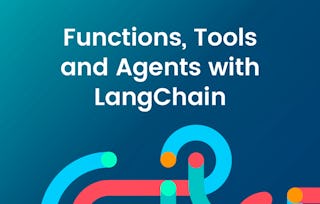Are you ready to build AI that thinks, acts, and gets things done? In this course, you’ll learn how to design agents that go beyond language generation to reason, take action, and tackle real-world tasks using tools and data.
即将结束: 只需 199 美元(原价 399 美元)即可通过 Coursera Plus 学习新技能。立即节省

您将学到什么
Develop AI agents that can reason and perform tasks independently
Implement tool calling and chaining to create structured AI workflows
Utilize built-in LangChain agents to analyze data, generate visualizations, and execute database queries
Apply best practices in prompt engineering and tool calling to enhance AI agent performance
您将获得的技能
要了解的详细信息

添加到您的领英档案
11 项作业
了解顶级公司的员工如何掌握热门技能

积累特定领域的专业知识
- 向行业专家学习新概念
- 获得对主题或工具的基础理解
- 通过实践项目培养工作相关技能
- 获得可共享的职业证书

该课程共有3个模块
In this module, you'll discover what AI Agents are, compare AI agent system designs, and learn when, and when not, to use them. You'll learn how tool calling and chaining work together in LangChain to create powerful AI systems. You'll learn to connect language models with external tools and gain skills you can use to build systems that perform precise operations while maintaining natural conversational abilities.
涵盖的内容
8个视频2篇阅读材料4个作业1个应用程序项目6个插件
In this module, you'll orchestrate components through structured workflows using LangChain Expression Language (LCEL). You’ll learn how to manually invoke tools in LangChain by parsing large language model (LLM) outputs, validating inputs, and executing functions. You’ll build a real-world tool calling agent that includes workflows where the LLM suggests tools while you retain full control for processing the query.
涵盖的内容
4个视频1篇阅读材料4个作业3个应用程序项目3个插件
In this module, you'll learn how to use LangChain's built-in DataFrame and SQL agents for data analysis and database operations. Discover how these pre-built agents implement natural language interfaces for conversational data analysis, making insights available to users without technical expertise. You'll learn how to build AI-driven applications that convert conversational queries into structured data operations, enhancing usability and decision-making.
涵盖的内容
4个视频3篇阅读材料3个作业2个应用程序项目3个插件
获得职业证书
将此证书添加到您的 LinkedIn 个人资料、简历或履历中。在社交媒体和绩效考核中分享。
提供方
从 Software Development 浏览更多内容
 状态:免费
状态:免费DeepLearning.AI
人们为什么选择 Coursera 来帮助自己实现职业发展




学生评论
96 条评论
- 5 stars
79.16%
- 4 stars
14.58%
- 3 stars
4.16%
- 2 stars
1.04%
- 1 star
1.04%
显示 3/96 个
已于 Oct 7, 2025审阅
It was made easy and lab launch added so much of hands-on knowledge. Only if you could make it available for life-time access.
已于 Dec 2, 2025审阅
Great simple & easy course, but some Lab's code snippets had typos/issues ;)
已于 Oct 1, 2025审阅
It provides enough general and specific knowledge to create complex AI Agents. A great entry point to Agentic AI
常见问题
AI agent development skills are valuable for roles such as Software Developers, Data Scientists, Machine Learning Engineers, AI Developers, AI Engineers, and Automation Specialists.
These positions involve building intelligent systems that use language models to interact with tools, run code, and automate real-world workflows. These are skills that are increasingly in demand across tech-driven industries.
Not at all! If you're already familiar with Python, you're all set. This course teaches you how to create AI agents using LangChain. You won’t need an advanced machine learning background to build real-world, action-oriented AI systems.
Building AI agents goes beyond writing fixed application logic. It focuses on creating intelligent systems that can reason, make decisions, and take action by calling external tools, executing code, and interacting with data. While you still use Python and frameworks like LangChain, the approach includes designing structured workflows using function calling, chaining, and tool orchestration. This enables your applications to respond intelligently and perform tasks autonomously, offering far more flexibility than traditional software.
更多问题
提供助学金,













